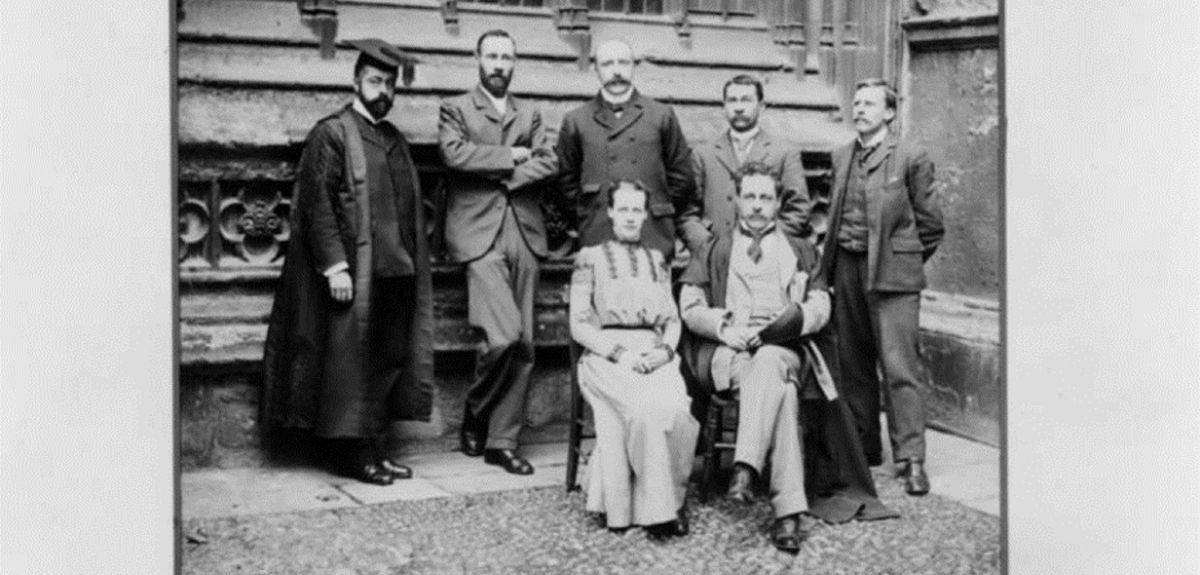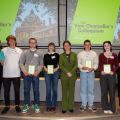
'Must it be a man?' An examination of women's contribution to the University of Oxford
Dr Elizabeth Baigent, University Reader in the History of Geography and SCIO Senior Tutor, discusses the forthcoming online centenary conference, how it will explore the rich variety of women who have helped to shaped Oxford into what it is today and how you can attend.
It is 100 years since women won the right to take their degrees at the University of Oxford ending centuries of exclusion and decades of struggle. In the academic year 2020-21 we're celebrating the events of 1920, but it's important to use the centenary year not just to focus on those particular events, but also to reflect more widely on women's place in the collegiate University before, during, and after the graduation. As part of that, a centenary conference will explore the rich variety of women who were present in the University around the time of that women were first allowed to graduate.
The Covid-19 pandemic means that the conference has had to move from the Bodleian Library to online, but rather than limiting the event, going digital means we're able to open it to a much wider audience: to people outside Oxford and those who don't normally go to academic conferences. Even those who can't attend on the day can register and look at the recorded version afterwards, and subtitles to the recording will help those with hearing challenges.
The thinking behind the conference owes much to my time as Research Director of the Oxford Dictionary of National Biography. Revising the original nineteenth-century dictionary gave us the chance to uncover the stories of women who had contributed to national life in interesting and sometimes unexpected ways, but whose stories had gone untold. Their lives made the dictionary richer and more representative of national life.
The same kind of thinking lies behind the centenary conference: we can use the centenary as the moment to uncover women's contributions in all corners of Oxford life and this will make our understanding of the University richer and more representative - as well as more entertaining. Taking a broad view of the University - to include colleges, departments, museums, libraries, and Oxford University Press - gives us the chance to explore the variety of women's contributions. So at the conference we'll certainly be discussing important players in the struggle for degrees (the heads of women's colleges for example) but we'll also be uncovering the stories of the women who were domestic servants in colleges.
We'll be looking at the women sitters whose portraits grace Oxford walls, but we'll also consider female librarians who laboured behind the scenes. We'll celebrate the women who produced the knowledge in Oxford's books, and those who produced the books themselves in the OUP bindery. We'll meet again some very public female figures in Oxford life and meet for the first time women known as somebody’s wife or daughter, if they were known at all. We'll consider landmark works of scholarship - the Oxford English Dictionary and Oxford Dictionary of National Biography - and examine the women who helped to create them and the women who appear in them.
The conference title comes from research into the first of those works: ‘Must it be a man?’ wrote Charles Herford to James Murray when Murray was looking for an assistant to work on his Oxford English Dictionary. The expectation in 1906, when the letter was written, was that such positions and many others like them would ‘naturally’ fall to men, but, as we'll discover during the conference, there were women who defied the odds and had notable success. Whether they became well known writers or academics, or kept their families afloat by their hard work as servants, these women have stories which we shall enjoy hearing at the conference.
Discussing the significance of both recognising the contributions of women at Oxford, Gill Aitken, Registrar at Oxford University, centenary champion and speaker at the conference, said: ‘Oxford’s journey towards gender equality has been hard fought and most importantly, is not over yet. Recognising 100 years of women being admitted to Oxford reminds us of the significance of the milestone – both because of how much has changed in the last hundred years, but also because women have only been recognised as members of the University for 100 years.
‘From the current Vice-Chancellor to our academics, administrators, students and kitchen staff Oxford’s women share one common trait: they are all extraordinary in their own way as they contribute to the excellence that is Oxford University. Understanding more about them through this necessary event, will I hope bring celebration and pride to women both within and beyond the University, as well as the confidence to expect and demand rights, opportunities and recognition for all we are and do.’
Everyone is welcome to come along to the conference, and uncover the stories of the women of Oxford at 'Must it be a man?' An examination of women's contribution to the University of Oxford, on 2 March 2021, 9:00am-16:00pm.
Event registration and details on speakers and the running order of the day are available here.
There is no charge to attend the conference, which is generously hosted by the Bodleian Library.
 Nature degradation could cause a 12% loss to UK GDP
Nature degradation could cause a 12% loss to UK GDP
 Landmark study definitively shows that conservation actions are effective at halting and reversing biodiversity loss
Landmark study definitively shows that conservation actions are effective at halting and reversing biodiversity loss
 Researchers find oldest undisputed evidence of Earth’s magnetic field
Researchers find oldest undisputed evidence of Earth’s magnetic field
 Honorary degree recipients for 2024 announced
Honorary degree recipients for 2024 announced
 Vice-Chancellor's innovative cross-curricular programme celebrated
Vice-Chancellor's innovative cross-curricular programme celebrated